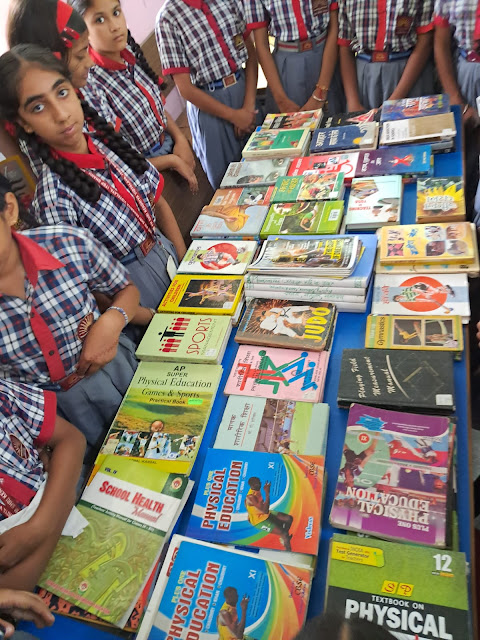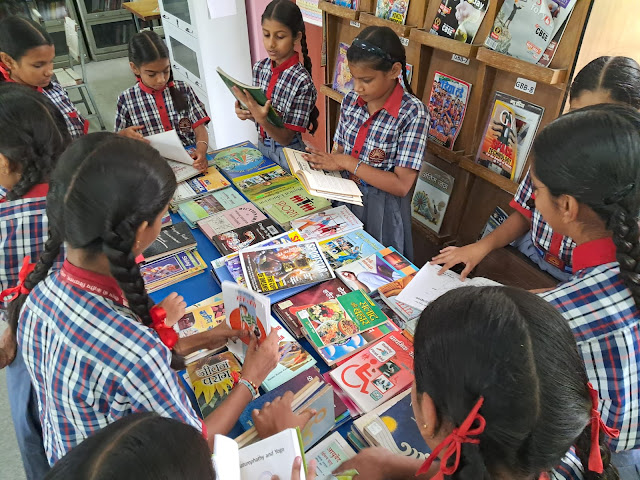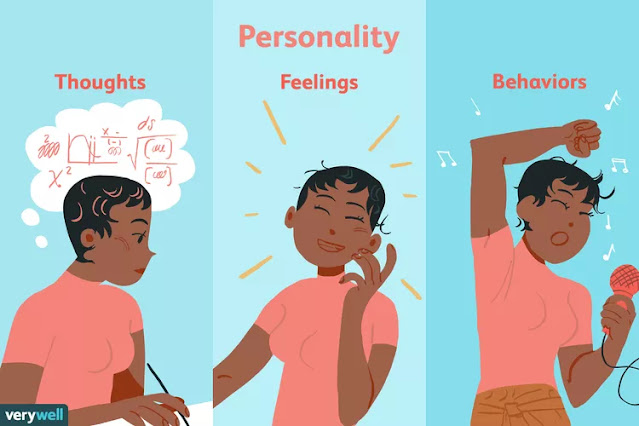Implementation Guidelines for PM SHRI Phase - I - 2024-25.
Library Grant for Sr. Secondary Schools.
(up to highest class XII) -16
● Needs Assessment: Conduct a survey or assessment to identify the interests and educational needs of students and teachers, ensuring the periodicals selected are relevant and engaging.
● Curriculum Alignment: Choose periodicals that align with the curriculum across different subjects, including science, mathematics, language arts, social studies, and the arts.
● Age Appropriateness: Select periodicals appropriate for the age and reading level of the students in the school.
● Local and Global Perspectives: Include periodicals that offer both local and global perspectives to help students develop a broader understanding of the world.
● Quality and Reputation: Choose periodicals from reputed publishers known for high-quality content and responsible reporting.
● Subscription Management: Consider the frequency of publication and manage subscriptions efficiently to ensure timely delivery and accessibility.
● Student and Teacher Input: Gather feedback from students and teachers on the periodicals available in the library and adjust selections as needed.
● Budget Allocation: Allocate the library grant judiciously to maximize the variety and number of periodicals while staying within budget.
● Digital Access: Consider digital periodicals or online subscriptions to supplement the print collection and provide additional access options. Suggestive List of Periodicals for School: Government
Publications
1. Yojana ● Publisher: Ministry of Information and Broadcasting, Government of India ● Description: Yojana is a monthly magazine that covers socio-economic issues, government policies, and development programs. It provides in-depth analysis and insights into various topics relevant to India's progress.
2. Kurukshetra ● Publisher: Ministry of Rural Development, Government of India ● Description: Kurukshetra is a monthly journal focusing on rural development, agriculture, and social issues. It includes articles on government initiatives, rural livelihoods, and sustainable development.
3. Science Reporter ● Publisher: National Institute of Science Communication and Policy Research (NIScPR), part of the Council of Scientific and Industrial Research (CSIR) ● Description: Science Reporter covers a wide range of scientific topics, including technology, innovations, and current scientific research. It is a highly reputable source of science information.
4. Competition Success Review ● Publisher: Competition Review Pvt. Ltd. ● Description: While not a direct government publication, Competition Success Review (CSR) covers topics such as general knowledge, current affairs, and guidance for competitive exams. It is beneficial for students preparing for government and other competitive exams.
5. Employment News / Rozgar Samachar ● Publisher: Ministry of Information and Broadcasting, Government of India ● Description: Employment News (English) and Rozgar Samachar (Hindi) are weekly periodicals providing information about government job openings, career opportunities, and exam notifications.
6. Indian Journal of Agricultural Sciences ● Publisher: Indian Council of Agricultural Research (ICAR) ● Description: This journal publishes research papers and articles on agricultural sciences, including topics such as agronomy, horticulture, and animal husbandry.
7. Indian Journal of Medical Research ● Publisher: Indian Council of Medical Research (ICMR) ● Description: This journal focuses on medical research and health sciences. It includes original research articles, reviews, and editorials.
8. Swachh Bharat Magazine ● Publisher: Ministry of Housing and Urban Affairs, Government of India ● Description: This publication highlights initiatives, news, and updates related to the Swachh Bharat Abhiyan (Clean India Mission)
9. Vigyan 2047. The foundation promotes scientific literacy and awareness through various mediums, including print, electronic, and social media in Indian languages. Its flagship publication, Bangla Bigyan Katha, is a popular science magazine in Bengali, and has recently been joined by Vigyan 2047, an English-language initiative under the Science Communication Popularization and Extension (SCoPE) program. www.shantifoundation.global Off.: UG-17, Jyoti Shikhar, District Center, Janakpuri, New Delhi 110 058 INDIA. Stay informed with the latest in Science, Technology, and Innovation. Subscribe to Vigyan 2047 – delivered to your home or accessible online across all devices. Price: INR 250 (Shipping included)
10. EDUCATION WORLD: English Monthly @500.00/- and Rs. 2500/-pa.
11. Parents world English Bimonthly @Rs.70 Ea. and Rs. 1200/- pa.
12. TFL: THE FLIM LIBRARY.COM @ Rs.30.00 per student.
Digital Publications from various government \ autonomous bodies
● MoE publications
● Publication division MoI&B
● National Digital Library, MoE
● CBSE Digital Resources etc.
Note: Magazines\ periodicals available in digital form above sources can be procured.
Feedback and record: ● Gather input from library users about their preferences and interests to make informed decisions about periodicals and competitions.
● Photographs and short videos of activities should be recorded and uploaded on Vidyalaya’s Social media platform and Vidyalaya’s website.
● FINANCIAL NORMS: ₹ 20,000/- (0.2 lac) per Vidyalaya
LIST OF SUGGUESTED PERIODICALS
Implementation Guidelines for PM SHRI Phase - I
-2024-25.
Library Grant for Sr. Secondary Schools (up to
highest class XII) -16
FINANCIAL NORMS: ₹ 20,000/- (0.2 lac)
|
SL |
PERIODICAL CONTACT DETAILS |
PUBLISHER |
Needs Assessment |
Rs. |
No |
Budget Allocation: Rs. |
Remarks |
||||||||
|
|
|
|
Curriculum Alignment |
Age Appropriateness: |
Local and Global Perspectives: |
Quality and Reputation: |
Student and Teacher Input: |
Digital Access |
RATE Ea. |
QTY |
QTY X RATE |
|
|||
|
1 |
MIB GOI |
Y |
Y |
Y |
Y |
Y |
Y |
|
|
|
Provides in-depth
analysis and insights into various topics relevant to India's progress. |
||||
|
2 |
MRD GOI |
Y |
Y |
Y |
Y |
Y |
|
|
|
|
Government
initiatives, rural livelihoods, and sustainable development. |
||||
|
|
|
|
|
|
|
|
|
|
|
|
|
|
|||
|
|
Publication
Division, Ministry of Information & Broadcasting, Govt. Of India,
Soochana Bhavan, CGO Complex, Lodhi Road, New Delhi-110003 |
1124665534 |
|
|
|
|
|
|
|
|
|
https://www.publicationsdivision.nic.in/index.php?route=product/product&path=&product_id=1682 |
|||
|
3 |
NIScPR CSIR |
Y |
Y |
Y |
Y |
Y |
|
|
|
|
wide range of scientific topics |
||||
|
|
|
011-25841647, 25843359
|
|
|
|
|
|
|
|
|
|
http://niscair.res.in/periodicals/sciencereporter
|
|||
|
4 |
Competition Review Pvt. Ltd |
Y |
Y |
Y |
Y |
Y |
|
|
|
|
General knowledge, current affairs, and guidance
for competitive exams. |
||||
|
|
|
|
|
|
|
|
|
|
|
|
|
|
|||
|
5 |
Pratiyogita Darpan |
Competition Review Pvt. Ltd |
Y |
Y |
Y |
Y |
Y |
|
|
|
|
General knowledge, current affairs, and guidance for competitive
exams. |
|||
|
|
Pratiyogita Darpan, 2/11 A, Swadeshi Bima Nagar, Agra-282002. |
2531101 |
|
|
|
|
|
|
|
|
|
care@pdgroup.in |
|||
|
6
|
MIB GOI |
Y |
Y |
Y |
Y |
Y |
|
|
|
|
Weekly periodicals
providing information about government job openings, career opportunities,
and exam notifications. |
||||
|
|
Editor,
Circulation Incharge,Employment News, Publications Divisions, Min. of I &
B, Room No. 779, VII Floor, Soochana Bhavan, CGO Complex, Lodhi Road, New
Delhi-110003. |
|
|
|
|
|
|
|
|
|
|
|
|||
|
7
|
ICAR |
Y |
Y |
Y |
Y |
Y |
|
|
|
|
Publishes research
papers and articles on agricultural sciences, including topics such as
agronomy, horticulture, and animal husbandry. |
||||
|
|
|
|
|
|
|
|
|
|
|
|
|
|
|||
|
8
|
Indian Journal of Medical Research |
ICMR |
Y |
Y |
Y |
Y |
Y |
|
|
|
|
Focuses on medical research and health sciences. It includes
original research articles, reviews, and editorials |
|||
|
|
|
|
|
|
|
|
|
|
|
|
|
|
|||
|
9
|
Ministry of Housing and Urban Affairs, GOI |
Y |
Y |
Y |
Y |
Y |
|
|
|
|
Highlights
initiatives, news, and updates related to the Swachh Bharat Abhiyan (Clean
India Mission) |
||||
|
|
|
|
|
|
|
|
|
|
|
|
|
|
|||
|
10
|
|
|
|
|
|
|
|
|
|
|
|
|
|||
|
|
|
|
|
|
|
|
|
|
|
|
|
|
|||
|
11
|
Indian Journal of
education |
Y |
Y |
Y
|
Y |
Y |
|
|
|
|
|
||||
|
|
|
|
|
|
|
|
|
|
|
|
|
|
|||
|
12
|
|
NCERT digital Resources |
Y |
Y |
Y |
Y |
Y |
|
|
|
|
|
|||
|
|
|
|
|
|
|
|
|
|
|
|
|
|
|||
|
13
|
|
NCERT digital Resources |
Y |
Y |
Y |
Y |
Y |
|
|
|
|
|
|||
|
|
|
|
|
|
|
|
|
|
|
|
|
|
|||
|
14
|
|
NCERT digital Resources |
Y |
Y |
Y |
Y |
Y |
|
|
|
|
|
|||
|
|
|
|
|
|
|
|
|
|
|
|
|
|
|||
|
15
|
|
|
Y |
Y |
Y |
Y |
Y |
|
|
|
|
|
|||
|
|
|
|
|
|
|
|
|
|
|
|
|
|
|||
|
16 |
|
|
Y |
Y |
Y |
Y |
Y |
|
|
|
|
Research Journal of
Science and Technology
|
|||
|
|
·
Lok Vigyan Parishad ·
Address: C-15, Tarang Apartments,
Indraparastha Extension, Delhi-110092 |
· |
|
|
|
|
|
|
|
|
|
www.lokvigyanparishad.in |
|||
|
17 |
CHAKMAK
|
9701814310
|
Y |
Y |
Y |
Y |
Y |
|
|
|
|
|
|||
|
18
|
SHTROT |
Y |
Y |
Y |
Y |
Y |
|
|
|
|
|
||||
|
|
Eklavya Foundation,
Jamanalal Bajaj Parisar,Fortune Kasturi ke Pass,Jatkheri, Bhopal-462026 |
|
|
|
|
|
|
|
|
|
|
||||
|
19
|
|
CBSE Digital Resources etc. |
Y |
Y |
Y |
Y |
|
|
|
|
|
|
|||
|
|
|
|
|
|
|
|
|
|
|
|
|
|
|||
|
20
|
|
National Digital Library, MoE |
Y |
Y |
Y |
Y |
|
|
|
|
|
|
|||
|
|
|
|
|
|
|
|
|
|
|
|
|
|
|||
|
21 |
DOWN TO EARTH HINDI
|
|
|
|
|
|
|
|
|
|
|
|
|||
|
|
|
|
|
|
|
|
|
|
|
|
|
|
|||
|
22
|
MANORMA |
|
|
|
|
|
|
|
|
|
|
|
|||
|
|
Subscription Division,
M.M. Publications Ltd., P.B. No. 226, Kottayam, Kerala - 686001. |
4812563721 |
|
|
|
|
|
|
|
|
|
subscriptoin@mp.in |
|||
|
23
|
CHAMPAK |
|
|
|
|
|
|
|
|
|
|
|
|||
|
24
|
SARITA |
|
|
|
|
|
|
|
|
|
|
|
|||
|
25
|
GRAH SOBHA |
|
|
|
|
|
|
|
|
|
|
|
|||
|
|
Delhi Prakasahan Vitran
Pvt. Ltd., E-8, Jhandewala Extension, Near Rani Jhansi Marg, New Delhi-110055 |
8448609322 |
|
|
|
|
|
|
|
|
|
https://www.champak.in/subscribe |
|||
|
26 |
SPORTS STAR |
|
|
|
|
|
|
|
|
|
|
|
|||
|
|
Kasturi Building, 859-860,
Anna Salai, Chennai-600002 |
1800-102-1878
|
|
|
|
|
|
|
|
|
|
https://pay.hindu.com/esubspay/Subscription
|
|||
|
27
|
ROBIN AGE |
|
|
|
|
|
|
|
|
|
|
|
|||
|
|
RobinAge c/o Deep Prakash,
11 & 12, Shah and Nahar Industrial Estate, Dr E Moses Road,
Worli, Mumbai - 400018, India. |
9326577387
|
|
|
|
|
|
|
|
|
|
https://www.robinage.com/subscribe.htm info@robinage.com |
|||
|
28 |
CAREER 360 |
|
|
|
|
|
|
|
|
|
|
|
|||
|
|
Pathfinder Publishing Pvt.
Ltd., CAREERS360, Plot No. 78, Bhagwan Mahaveer Marg, Sector 44, Gurugram, Haryana - 122003 |
|
|
|
|
|
|
|
|
|
|
info@career360.com |
|||
|
29
|
BAAL HANS |
|
|
|
|
|
|
|
|
|
|
|
|||
|
|
Balhans (Pakshik), Vitran
Vibhag, Rajsthan Patrika Prakashan, 5-E, Jhalna Sansthanik Khsetra, Jaipur
(Rajasthan)-302004 |
14171566666
|
|
|
|
|
|
|
|
|
|
info@epatrika.com |
|||
|
30
|
AKKAD BAKKAD |
|
|
|
|
|
|
|
|
|
|
|
|||
|
|
|
|
|
|
|
|
|
|
|
|
|
|
|||
|
31
|
FARM FOOD |
|
|
|
|
|
|
|
|
|
|
|
|||
|
|
|
|
|
|
|
|
|
|
|
|
|
|
|||
|
32
|
MYSUBS |
|
|
|
|
|
|
|
|
|
|
MYSUBS is India’s leading Magazine and
Journal subscription on-line store, owned and operated by SDRD Solutions Pvt
Ltd. We offer one of the most comprehensive collection of magazines and
journals. Now in eighth year of operation, we have successfully sold in the
excess of one lac seventy thousand subscriptions. |
|||
|
|
SDRD Solutions Pvt Ltd, |
011
41161200 (8 Lines)
|
|
|
|
|
|
|
|
|
|
||||















.jpeg)












.jpeg)




